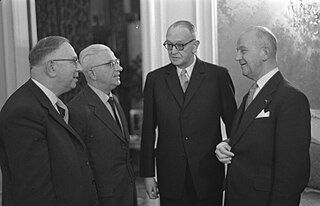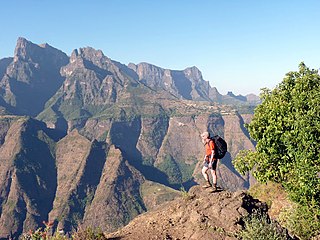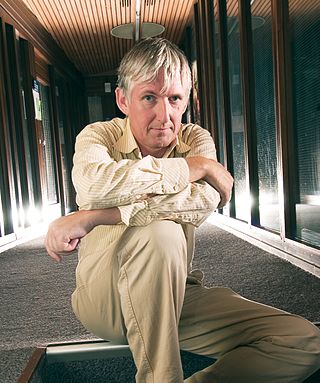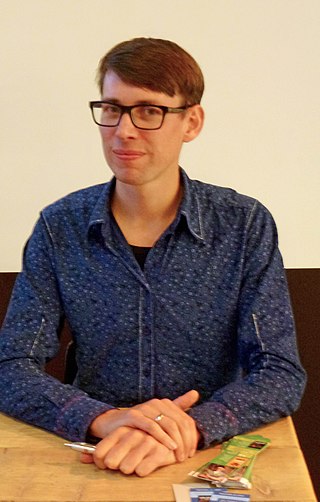Related Research Articles

Arnon Yasha Yves Grünberg is a Dutch writer of novels, essays, and columns, as well as a journalist. He published some of his work under the heteronym Marek van der Jagt. He lives in New York. His work has been translated into 30 languages. In 2022 he received the PC Hooftprijs, a Dutch literary lifetime achievement award. His most acclaimed and successful novels are Blue Mondays and Tirza. The New York Times called the latter ‘grimly comic and unflinching (…) while not always enjoyable, it is never less than enthralling’. Frankfurter Allgemeine Zeitung described him as ‘the Dutch Philip Roth’.

Ferdinand Van der Auwera, pseudonym Fernand Auwera was a Belgian writer. His fragile health during his youth and its impact on his life (solitude), had an effect on his first literary work.

Jan Ritzema Bos was a Dutch plant pathologist and zoologist. He served as the first director of the Willie Commelin Scholten Foundation and founder of the Plant Protection Service in 1899 in Amsterdam. Bos described several species of plant nematode.
The Ferdinand Bordewijk Prize is a literary award, presented annually by the Jan Campert Foundation to the author of the best Dutch prose book. The prize was established in 1948 as the Vijverberg Prize, before being named after the Dutch author Ferdinand Bordewijk in 1979. As of 2024 the prize includes a cash prize of €6000.

The Constantijn Huygens Prize is a Dutch literary award.

Tonnus Oosterhoff is a Dutch poet and writer.
Sytse Wybren Douma is a Dutch organizational theorist, consultant and Emeritus Professor at the Tilburg School of Economics and Management of the Tilburg University, known for his work with Hein Schreuder on "Economic approaches to organizations".

Mark van Loosdrecht is a Dutch professor in environmental biotechnology at Delft University of Technology. He was the creator of Nereda, a wastewater treatment technology developed by a cooperation between the Delft University of Technology, the Dutch Foundation for Applied Water Research (STOWA) and Royal HaskoningDHV.

Matthijs Nicolaas Röling was a Dutch painter, active as graphic designer, wall painter, painter, draftsman, lithographer, pen artist, etcher, and academy lecturer. He is considered a kindred spirit of the 3rd generation of the Dutch Group of figurative abstraction. Röling is described as the "figurehead of contemporary figurative painting in the Netherlands."
GITP is a HRD consultancy firm, founded in 1947 in collaboration with the Nijmegen University and the Tilburg School of Economics (Netherlands). Founders were Professor Dr. Theo Rutten and Professor Jan de Quay. Their objective was to contribute to economic restructuring of the Netherlands after World War II employing the most modern scientific insights, based on the philosophy that the right man or woman must be at the right job. A key contribution to achieve this came from the Marshall Plan, which provided funds.

Johan Antoon Reinier Alex Maria "Jan" van Hooff is a Dutch biologist best known for his research involving primates. He was professor of comparative physiology at Utrecht University from 1980 to 2001.

Jan Borgman was a Dutch astronomer and university administrator. He was professor of astronomical observation technique at the University of Groningen from 1968 to 1988. During this period he served as rector magnificus from 1978 to 1981 and chair of the board of governors from 1981 to 1988. Borgman subsequently became chairperson of the Netherlands Organisation for Scientific Research.

Jan Luiten van Zanden is a Dutch economic historian and professor of Global Economic History at Utrecht University. He is a widely acknowledged specialist in Dutch, European and Global Economic History.

Sylvia Weve is a Dutch illustrator.

Bette Westera is a Dutch children's writer. She has won numerous awards for her work.

Simon van der Geest is a Dutch writer and poet.
Willem Albertus"Wim"van Es is a Dutch archaeologist. Between 1965 and 1988, he was director of the Rijksdienst voor het Oudheidkundig Bodemonderzoek.
Egbertus "Egbert" van Slogteren was a Dutch professor of horticulture and phytopathology, known for his research on flower bulbs and diagnosis of viral diseases in plants.

Marcel Dicke is a Dutch professor of entomology who has been affiliated with Wageningen University since 2002. He conducts research on insects and has published in the scientific journals Science and Nature. Dicke received the Spinoza Prize in 2007 for his research on the interactions between plants and insects.
Wetsus - European Centre of Excellence for Sustainable Water Technology is a research centre for water technology in Leeuwarden, the Netherlands. Over one hundred companies and twenty knowledge institutes work together at Wetsus to develop solutions for global water issues.
References
- ↑ D. J. van de Kaa; Kaa; Y. de Roo (19 December 2008). De Leden Van de Koninklijke Nederlandse Akademie Van Wetenschappen: Een Demografisch Perspectief: 1808 Tot 2008. Amsterdam University Press. p. 335. ISBN 978-90-6984-552-4.
- 1 2 3 4 5 6 7 8 9 Rinny E. Kooi (2015). "Louis Schoonhoven, een echte Wageninger" (PDF) (in Dutch). Entomologische Berichten. Archived from the original (PDF) on 24 July 2020.
- 1 2 Gert van Maanen (28 February 2015). "'Bloembiologie blijft verrassen'" (in Dutch). Bionieuws. Archived from the original on 26 July 2020.
- ↑ "Oud-hoofdredacteuren Vakblad, Biovisie en Bionieuws door de jaren heen" (in Dutch). Bionieuws. 5 October 2019. Retrieved 24 July 2020.
- ↑ "Niet zonder elkaar" (in Dutch). Vroege Vogels. 19 March 2015. Archived from the original on 26 July 2020.
- ↑ "Alumnus schrijft boek" (PDF) (in Dutch). University of Groningen. April 2020. Archived from the original (PDF) on 26 July 2020.
- ↑ "Louis Schoonhoven". Royal Netherlands Academy of Arts and Sciences. Archived from the original on 20 June 2020.
- ↑ Caspar Janssen (18 October 2015). "Jan Wolkersprijs 2015 voor 'Niet zonder elkaar - bloemen en insecten'" (in Dutch). de Volkskrant. Retrieved 24 July 2020.
- ↑ Jan Wolkers Prijs 2015 (in Dutch). Dutch Heights. Archived from the original on 24 July 2020.